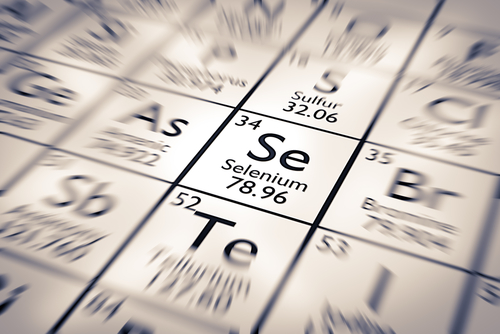
You may never have heard of selenium until you watched the movie Ghostbusters and heard Ray Stanz utter, “Cold riveted girders with cores of pure selenium”.
The fact is that selenium is a little-known, yet vital, component of human health.
Are you getting enough of it? Check out these selenium facts if you care about your health.
What is Selenium?
Selenium is a nonmetal element with the symbol Se. Its atomic number is 34 and it shares some characteristics with arsenic.
It gets its name from the Greek Goddess, Selene, who is the goddess of the moon.
The element occurs naturally in the soil and water. It exists in both inorganic and organic forms. Soils contain inorganic selenium, which plants absorb from their environment and convert to its organic form.
Animals absorb selenium from the plants they eat and store it in their muscles and tissues.
Human beings need trace amounts of selenium in their diet to facilitate several important body processes. Since selenium comes from the soil, it only occurs naturally in plants grown where it is naturally present.
Why Do You Need More Selenium?
Since selenium is rarely present in our everyday diets, many people don’t get enough selenium for optimum health.
Too little selenium results in autoimmune thyroiditis, or Hashimoto’s Disease, caused by a hormonal imbalance which in turn leads to an underactive thyroid.
Some of the symptoms of this malady include inflammation, sluggishness, and unexplained weight gain. While hormone treatment is an effective defense against this condition, it’s best to avoid it altogether.
Some of the other benefits of selenium include:
- Reduction of oxidative stress
- Lowering the risk of cancer
- Increasing levels of the antioxidant, glutathione peroxidase
- Prevention of Alzheimer’s disease
- Mood regulation
- As a defense against colds and flu
Studies are ongoing about the role that this trace element plays in human health and illness.
Selenium itself has proved to be a somewhat effective guard against high blood pressure during pregnancy as well as diseases of the heart and blood vessels. It’s also thought to be instrumental in regulating the body’s immune response.
How Selenium Works in the Body
Selenium plays a small role in several vital immune-system bodily processes. It helps your body manufacture proteins called antioxidant enzymes, which help prevent cell damage.
It’s instrumental in producing the major antioxidant enzyme glutathione and binds to sulfur-containing cysteine to form antioxidant selenoproteins in the body.
These selenoproteins carry more selenium to the tissues, where it can do more good work.
Selenium stops the activation of NF-kB which controls inflammation and blocks the release of further inflammatory agents into the bloodstream. It also lowers concentrations of the inflammatory marker CRP, prevalent in inflammatory and autoimmune diseases.
Studies show that selenocysteine, made from selenium and sulfur, helps reset your circadian clock. It causes circadian rhythm genes to peak at nighttime when they should, thus restoring natural sleep rhythms.
Selenium-Rich Foods
The presence of selenium depends more on where food is grown rather than the actual types of food that contain it. Yet, nutritionists recognize some foods as good sources of this mineral.
Brazil nuts, Brown rice, Baked beans, Sunflower seeds, oatmeal, mushrooms, cashews, bananas, and spinach are usually good sources of selenium.
On the animal front, fish, ham, pork, beef, turkey, and chicken contain selenium. Milk and yogurt also contain selenium.
Apart from these dietary sources, you can also take selenium in the form of over-the-counter dietary supplements.
Unfortunately, some food processing techniques destroy selenium, so you can never know for sure if you’re getting enough of it in your diet.
Recommended Intake of Selenium
Selenium may be beneficial to human life, but it’s also toxic in large doses. So it’s important to know how much is too much.
For adults, anything over 400 micrograms of selenium per day is too much. Human beings require around 55 micrograms per day.
Children under 3 shouldn’t have more than 20 micrograms per day, 30 micrograms per day’s best for children between 4 and 8, while children from 9 to 13 need about 40 micrograms daily.
What Happens if You Take Too Much Selenium?
When you do the math, it’s easy to see that even if you double your recommended daily intake with a selenium supplement, you’ll still be well below toxic levels.
Early warning signs of too much selenium include fever, nausea, and bad breath. These can soon lead to heart, kidney, and liver problems. At it’s worst, a selenium overdose causes organ failure and ultimately death.
Studies have linked selenium overdose to an increased risk of contracting skin cancer in high-risk individuals.
Sometimes, selenium causes adverse effects when taken in conjunction with other supplements and medications. These include antacids, chemotherapy drugs, corticosteroids, niacin, birth control pills, and cholesterol-lowering statins.
It’s a good idea to consult a nutritionist or your doctor before taking a selenium supplement.
Little Known Selenium Facts
Apart from its nutritional uses, manufacturers us selenium to create the pigment China red, to decolorize glass, or color it red.
It’s also used in steel production, and in photocopiers, semiconductors, and photocells, as well as in assorted medications.
Check out some more unusual information about Selenium and its compounds:
- Selenium first shot to fame in the 1930s due to its toxicity
- Selenium salts help control dandruff
- Selenium and its compounds have anti-fungal properties
- Alexander Graham Bell created a selenium-based photophone in 1879
Thanks to its many uses, mines extract around 2,000 tons of selenium from the earth every year. It’s also an important by-product of the copper mining industry.
Get More of the Good Stuff
Do you have an insatiable curiosity about life? Our website covers a wide range of topics from selenium facts to celebrity insights.
Keep reading if you want to know more about what’s good for you.